Pranav Reddy, a filmmaker from Hyderabad, India and the founder of Mirage Media, recently finished his latest film project, Occupied, a documentary web series on Palestine. The Mirage Media team landed in the West Bank to begin working on this raw and powerful five-part series back in 2019/2020, capturing the young, creative, disenfranchised Palestinians and their language of resistance — those who have chosen the path of creativity over conflict as a response to the world around them.
“Everyone in the series talks about the occupation, but no one talks about how they are living under occupation or what their actual occupation is, hence the title Occupied. It speaks to the fact that normal life goes on — it might be abnormal, but it’s still going to exist. In the end, they are just like you and me, leading an ordinary life. The only difference is that they are living under occupation.
The individuals featured and the experiences shared by them, speak to a collective reimagining of what resistance in the face of aggression can look like — resistance that has taken the shape of music serenading patrons at the local watering hole, art that adorns the walls lining pavements and poetry gushing forth from the lips of brave women and men who know no other language. It is their celebration of life, love and hope, set against the backdrop of persecution and marginalization, with a singular belief at its core — in the end, love always wins.”
The Mirage Media team is entering the film into noteworthy international film festivals and has already won in a few: the Brussels International Film Festival Athens film festival, Rhode Island International Film Festival, Bushwick Film Festival, KIIF and North Dakota Human Rights Film Festival. The trailer was launched by Shruti Haasan and Rana Dagubatti. Occupied will be available to stream in April 2023.
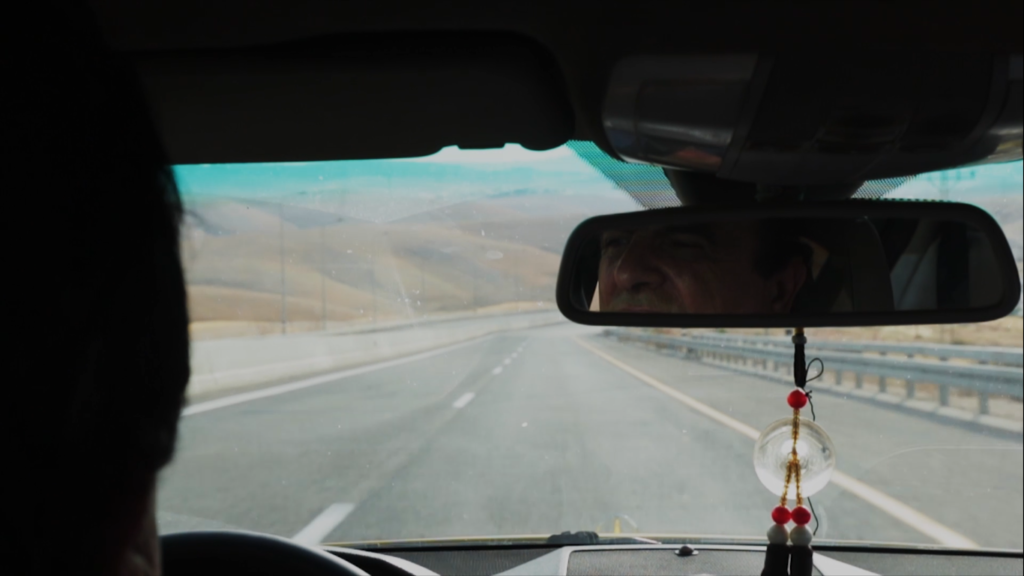
The view from inside a Palestinian cab on the infamous ‘Apartheid Road’ near the Jerusalem-Tel Aviv highway. Israelis can drive on these roads for quick and ‘safer’ access to Jerusalem, but Palestinian vehicles heavily prohibited to use the highway. Only those with a yellow number plate are allowed access.
Naomi Joshi Tell me a bit about Occupied – what’s the background story?
Pranav Reddy When I set up Mirage Media, I told myself I’d work on causes that really impact me and open my eyes to doing things that are slightly different. So, we did a documentary on leprosy, we did a documentary on child abuse and we did a documentary on rape and prostitution. In regards to the marginalized communities in India, these conversations never came up in Hyderabad, especially in the environment that I was brought up in. But the lack of these discussions always stayed with me.
I was concerned about the direction the country was heading — the hatred, the violence, the hardships certain communities were going through. Although some of my best friends are Muslim, these conversations simply weren’t being had. It was really painful. A lot of my friends felt insecure about the country, especially India — we’re supposed to be the largest democracy in the world. People were worried that just because your name is Abdullah Aziz, something might happen to you. And they’re right to feel that way. On top of that, there was a lot going on in the Middle East, and I was always very conscious of what was happening with Palestine. I felt that the news I was consuming, the information that was being broadcasted and the kind of stories that were being told from their land was only about the pain and suffering. I knew a lot of people who wanted to get involved in the Middle East, but they found it extremely hard to go there and voice their opinions because of their religion. It was impossible to access Israel.
About six years ago, I started doing a lot of reading on Palestine. I wanted to understand what was going on, on a deeper level — why were they fighting so resiliently, why there was so much pain and suffering and why it is that even now, in this day and age, we are unable to find a peaceful resolution. The main thing I noticed was that there was only one side of the narrative being told. And that made me want to take this story and dissect it further. Everyone around me said: “No Pranav, you’re insane, you should do something about the struggle in Kashmir because you are Hindu.” But in this situation, my religious identity was irrelevant to me. There was something very wrong in Palestine, and as a filmmaker, I felt the need to document and present it to the world.
Fast forward to a couple of years later, I was still extremely interested in the Palestinian struggle. I was following it really closely and trying to understand what was happening in the West Bank and in Gaza. At this point the mentality at the company was: you have to do a lot of things that you don’t like in order to do things that you love. In order to run a company and keep ourselves afloat, we needed to make sure we’re paying salaries on time–so we were doing a lot of ads, weddings, you name it. Whatever work that came our way, we took it on, because I knew that eventually we’d make a big film about Palestine. I can’t even tell you why, but it was like a magnet. It’s all I was talking about, all I was reading about, all the films that I was watching. I had come across a fantastic film called Inch’Allah, and I was fascinated by how well it was shot. It got me thinking, maybe one day, I’ll be able to do this. There were so many people asking: “Why would you want to go there? It’s a war zone. There’s so much violence, why would you put yourself into a situation where you’re not going to be safe?” But I didn’t listen to anyone.
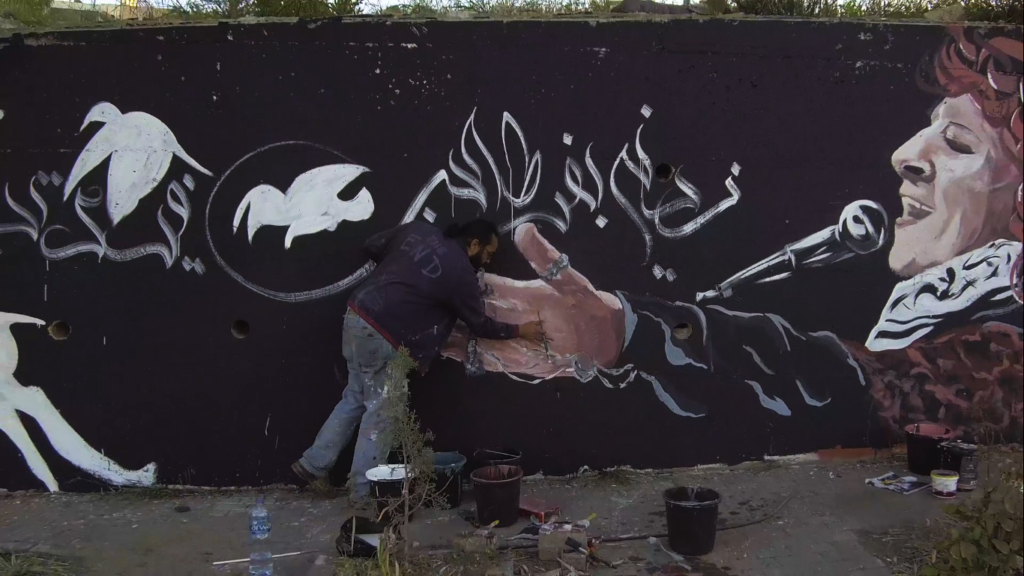
Hamza Abu Ayyash’s mural on a wall in Palestine. Hamza’s artworks mostly include calligraphy in adjusted forms as an expressive force. This mural is of the famous Palestinian singer Rim Banna.
“There are so many stories of people suffering, people dying, people losing their loved ones, but no one has actually focused on Palestinians just living as Palestinians, irrespective of being occupied.”


Naomi Why did you decide to focus on the young, disenfranchised, creative Palestinians? I’d like to hear more about the interconnectedness of art and resistance.
Pranav After taking a look at the kind of content that has been created over the years and the types of stories that I’ve come across, I felt the need to look at how young artists are dealing with the occupation outside of the realm of violence. If you look at history and at some of the finest artwork that exists, it’s always during times of violence or aggression. Art is a very powerful medium through which one is able to express oneself. There are so many stories of people suffering, people dying, people losing their loved ones, but no one has actually focused on Palestinians just living as Palestinians, irrespective of being occupied. There are so many people who are fighting this battle in other ways. I wanted to focus on how a musician is just writing a song and how a dancer is just dancing, forgetting about everything else that is going around — being able to find peace despite the world being in total chaos. What better way to talk about the life of a Palestinian than through the arts?
Naomi How many of your team members went to Palestine? When exactly was this and where did you live?
Pranav About three years ago, we met this fantastic guy called Shadi Zaqtan at an airport. My wife and I were traveling to Bangkok for a friend’s wedding but we decided to make a stopover in Vietnam. And at the airport in Vietnam, my wife went up to a group of people asking for a cigarette. One of the guys turned out to be Palestinian. She came back to me and said: “Pranav, this guy’s from Palestine, you’ve been saying that you want to go, why don’t you go and talk to him?” He was really interested in why an Indian wanted to talk about Palestine when there’s already so much chaos going on in India. In the middle of the airport, after a couple of minutes of us exchanging our Facebook, telephone numbers, etc., he said: “Pranav, since you’re so mad about Palestine, I’ll do one thing for you. If you ever come to Palestine, you just message me, and I’ll hook you up with every single thing that you need. And if you ever need a place to stay you can come and stay with me.” I remember thinking: This guy’s just talking out of his ass. He’s just saying it because we’re at the airport. It’s not like I’m ever going to meet him again in my life.
But, it happened. I wouldn’t say we had enough money but we had money for the plane tickets. It was me, Arvin and Prithvi who flew to Israel. I texted him shortly before we arrived and he told me: “You can come and stay with me.” But I still wasn’t really sure… I didn’t even know this guy. I had met him at an airport once. What were the chances? This was too good to be true. So, I was a little bit worried, on top of everything else.
One week before leaving, I had proposed to my girlfriend and got engaged, so my in-laws weren’t too happy that I was leaving. My parents didn’t know where I was going. They found out a couple of days before I left and told me I was insane. When we landed in Tel Aviv we went to Jerusalem straight away and I called up Shadi from Jerusalem. He told me: “Come to my house in Ramallah, you’ll stay with me.” And for the next 35 days I stayed with the most generous person I have ever met. I’ve never come across anyone more generous or with bigger hearts than the Palestinians, especially Shadi. I speak for both the team and myself when I say this — he changed our lives. Despite everything they’re going through they’re still willing to give. I find that phenomenal. I didn’t even realize how famous of a musician Shadi is in Palestine, that all came out later. He said to me: “Pranav, you’re doing something for Palestine, the least I can do is provide accommodation for you and the team.”
Naomi What was navigating Palestine like for you and your team? Did they welcome you with open arms?
Pranav It was fabulous. In the beginning, everyone wanted to know where we are from, who we are, etc. But by the fourth/fifth day, they would say, “Habibi come have some coffee and tea with me. Come talk to me. Can I get you some dinner? Can I take you for a ride?” After some time when we were taking taxis, they would recognize me: “Hey, you’re Pranav, you’re from Hyderabad — you’re the Indian.” I felt like I was in India, like this guy’s known me for 10-15 years, over the course of a week.
I went to so many people’s homes for coffee, we had drinks here and there, people would host us for dinner — everyone was so welcoming, especially after they found out that we’re making a film on Palestine. It was truly an impeccable experience. I don’t have the words to describe the kind of the journey we went on. They know many people from their neighboring countries aren’t willing to do something for them and so having a random team from India care so much, they were beyond grateful, as were we. It felt like I’ve lived there in my past life, like I was actually a Palestinian. I put my entire life savings into this project. It was hard, but I wanted to do it. I believed in the cause. I didn’t go there to talk about the Israelis or Palestinians. I just went there to talk about what I see and what the camera sees. The narrative will dictate itself, the visuals, the people — you’ll understand everything just by seeing what I’m showing you.
There’s something about the Palestinians in general, that sort of draws you to them. Every word that they speak is poetic, their approach towards life. They’re just grateful — about who they are, what they have. In my experience, you will never find them complaining about anything. And I felt that was a great lesson for every single human being to learn. That aspect really came across beautifully in every episode that we made — they were just being themselves, despite the daily troubles that they were facing due to the occupation. They never dwell on the problem that they’re facing, they’ll always talk about how happy they are and how they’re moving ahead. It’s such an inspiration and I wanted to depict that within Occupied.
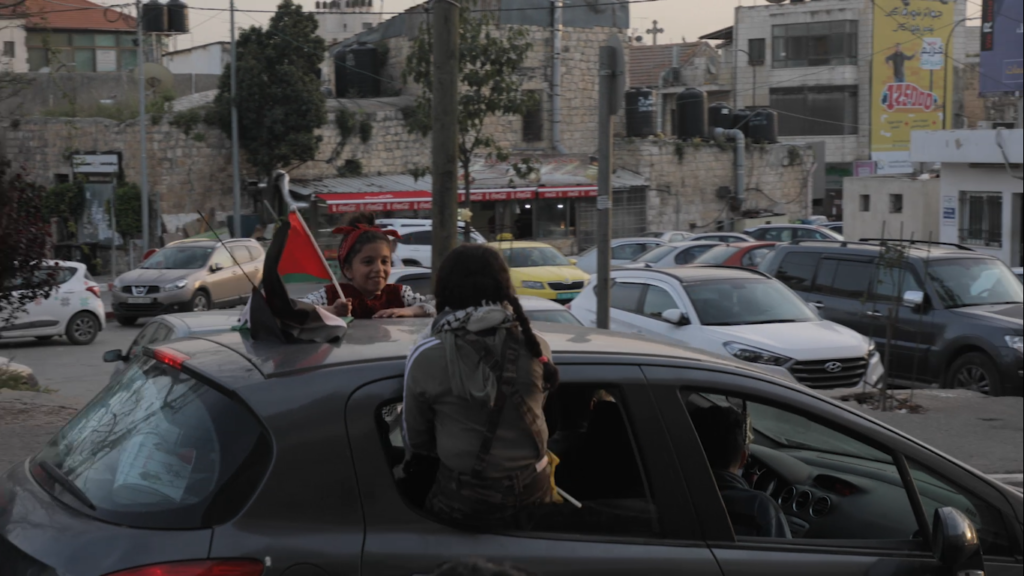
Two young children coming out of their car, waving a Palestinian Flag at a rally in Ramallah. The rally was carried out in solidarity after a Palestinian man was released from an Israeli jail after 20 years of wrongful imprisonment.
Naomi How did you find the subjects that you centered in the series? Was it difficult to find them, to get them to agree to be a part of your work? Or were they eager to get their voices heard?
Pranav We did a lot of research for a couple of years. We definitely had a vision and some idea of what kind of characters we wanted — there should be one musician, one artist, one calligraphist, one dancer, one political tour guide, etc. But like every great documentary, nothing works out once you’re on the ground. Either things get better or they get worse. And honestly, the narrative is built while you’re editing anyway.
I actually sent Shadi an email saying: “These are the kinds of characters that they’re looking for.” His response was casual: “Don’t worry, I’ll sort everything out for you.” I remember thinking, dude, this guy’s taking things really lightly. We’ve been putting years of research into this and he’s responding with one line answers… But I’m the kind of guy who will either go all in or I won’t do it at all. So I decided to take Shadi’s word for it. He’s basically a musician who runs a bar. And on the second or third day of our Palestine trip, he said: “Pranav, come to the bar, let me introduce you to everyone that I know.”
Within five minutes, my impression of literally every single person improved by 100%. While we were shooting this documentary, we were actually having so many conversations rather than just shooting all the time. I would go to Hamza’s house, the calligraphy artist, and I would sit there chatting with his mom. The team would go shooting somewhere else and later we’d be having conversations with his dad… It felt like I was just there on holiday but I happened to carry a camera around.
And things just fell into place — every single person, every single story, every single character that we had, for them it was just an ordinary story, but for anyone looking in it was truly extraordinary. All our characters were phenomenal. A lot of the trip was merely about spending time with them — to be honest, we just got really lucky. Many told us: “You can’t be carrying such heavy equipment because they’ll know that you’re up to something fishy.” But somehow we never got stopped while entering Israel. We were lucky to even come back to India with all that footage.
Naomi What are some misconceptions about Palestinians and Islam that are debunked in your documentary?
Pranav The biggest misconceptions people have of those in the Middle East is that they’re backwards, they’re violent and they’re uneducated. In reality, they are by far the most intelligent and compassionate lot of people I’ve ever come across. But the whole narrative is spun in a certain way. When you see the documentary you’ll understand what I mean.
Shadi is such an incredible speaker, he’s a true performer. He’s a Muslim who runs a bar in the heart of Ramallah and he loves playing music. These are three things that every single person who is so-called religious will say is the biggest sin that one can do. But just like anyone else, who am I to judge whether what he is doing is right or wrong? It’s his own relationship to God, who am I to decide? People like to talk but when it comes to being actionable, no one really wants to do anything; everyone wants to take a step back because they don’t want to get out of their own comfort zone. A lot of creators have great ideas but few actually want to go ahead and do the work, because it’s hard. I could have joined the commercial industry and made a shit ton of money but I wanted to work on stories that moved me. Not stories that are governed by my financial status. The universe works in mysterious ways and I know I’m lucky to make a decision like that.
Naomi There’s been a lot of discussion surrounding the term “conflict” when speaking about what’s happening in Israel and Palestine. Within the current discourse, would you say that this word is an accurate depiction of what’s going on?
Pranav As an Indian, I have more rights than a Palestinian. A Palestinian does not have an Israeli passport and only has a Palestinian ID. They cannot walk the same road as an Israeli. Is that not apartheid in the 21st century? When people talk about a conflict, there’s two sides. How are there two sides when one side is completely armed and puts a 765 feet wall around people who literally have no food or water? They control the electricity, control every single meal that they eat. Gaza is like a concentration camp. The West Bank is controlled by the Israelis. At the check point, which will literally take me three minutes to go through, it would take an average Palestinian at least an hour and a half. If the soldier was in a bad mood that day he could decide to send them off. And for that Palestinian, a loved one might be dying. Someone might need his help. He might want to see his grandmother or his mother. But if an Israeli soldier decided that he’s not going to cross — to another Palestinian village, I might add — then he can’t. The Israeli soldier always has more rights.
For people calling this a conflict — what are we talking about? Settlers go in there and piss on the Palestinian’s water tanks, just to make sure that the Palestinians cannot have water to drink or to have a bath. And I’ve seen this with my own eyes. I’ve seen settlers shout at young Palestinian children in Hebron telling them: “You’re filthy, you need to be thrown out, this is my land, this is my country.” And the Palestinian kid will look back and tell him: “My grandmother is older than you,” with a smile on his face. I asked this 11-year old kid, doesn’t this hurt you? And he told me: “I will never give an Israeli or a settler the pleasure to see me in pain.” I found that extremely powerful. It’s not a conflict, it’s ethnic cleansing, it’s apartheid, it’s taking complete control over people just because you have money and guns. This might be the situation now, but I truly believe that what’s just will always overcome.
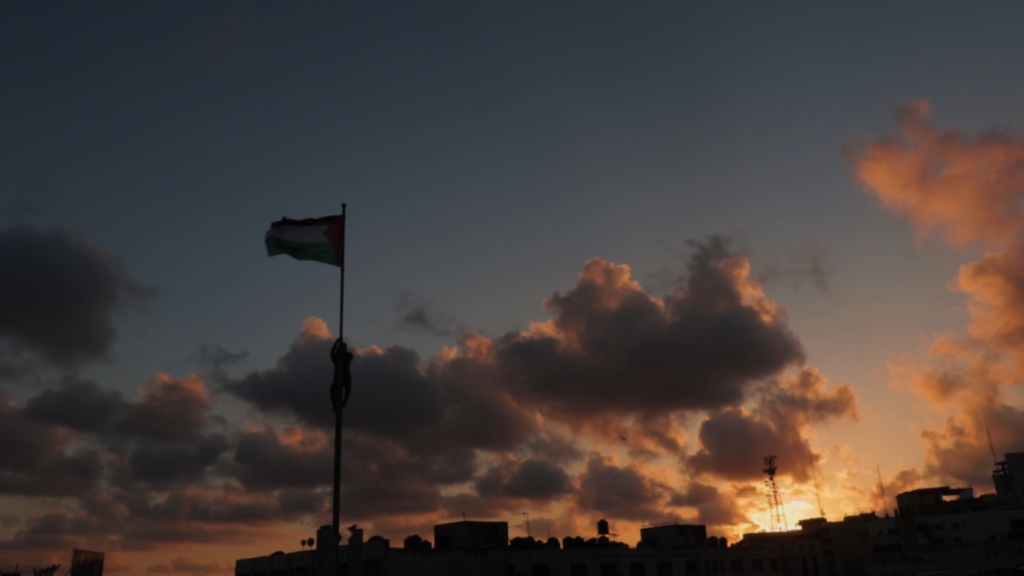
City silhouette in Ramallah’s Yasser Arafath Square, this popular landmark is made to represent Yasser Arafat’s personality as a leader. This monument resembles a lighthouse with a water fountain (not shown) to symbolize the intimate relationship between Yasser Arafat and his people.
“You will love the music, you will love the poetry, you will love the people, you will love the stories. Whether you are for the cause or against it, it will do that much. It will occupy a place in your heart.”
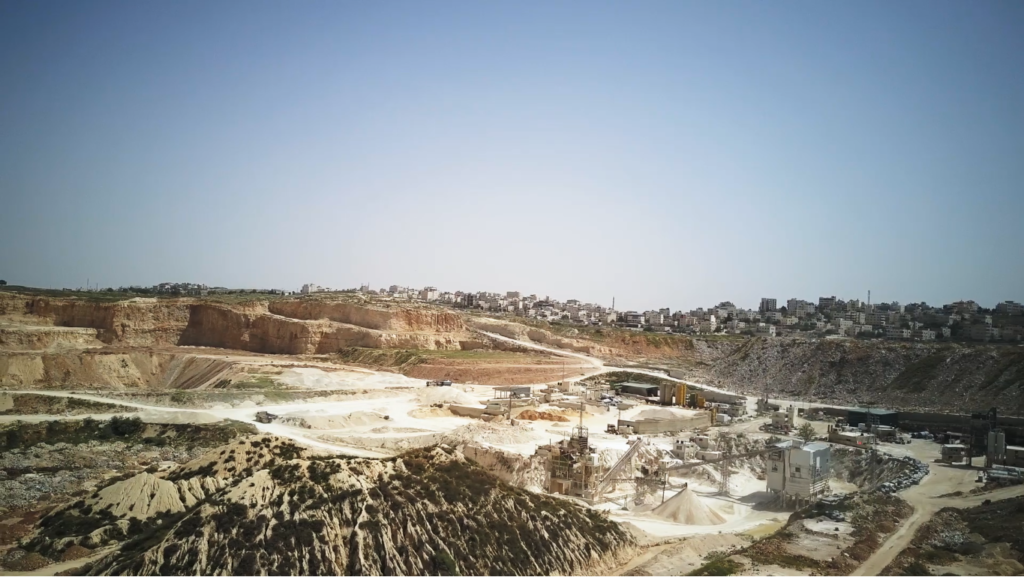
The vast landscape en route to Bethlehem, where 500 olive trees were burned to make space for an Israeli settlement.
Naomi Can you name some hopes in regards to what this film will achieve, what audiences it’ll reach and what minds it’ll change?
Pranav You should read this fantastic article, it’s called “The Occupation is Fundamentally and Undeniably Unjust,” written by an Irish author named Colum McCann. It talks about how the beauty of Palestine is not just the occupation but the people themselves — how they find peace despite all the chaos and the pain that they’re going through. For me, Occupied is extremely personal. When you expect something from someone or something, you always end up disappointed. I feel that Palestine has given me more than what I can ever give Palestine. I am blessed to have the opportunity to film this as a young filmmaker. The overarching message for the viewer is: We never actually know what is going on in someone’s mind — the pain and suffering that one goes through — until we actually converse and understand where it’s coming from. It’s easy for us to read a little bit and talk about it, but until we actually go and see it ourselves we are not here to pass judgment. I feel that Occupied is a small window into seeing how less is more, how one can be grateful for life and how one finds happiness irrespective of how much pain the others will always inflict onto you.
Occupied is a journey of Palestinians. It’s a journey of how they are living with hope, with energy, with joy, with love, with laughter. Everyone in Palestine is going through their own version of the occupation. Every single person is affected differently. Some people don’t get water, some people don’t get electricity, some people’s wives have been shot, someone’s mother has been stopped at a checkpoint, someone’s house has been stolen. Yes, all of that is happening, that will definitely come across in the film, but the beauty lies in the fact that although the Israelis control a lot, no one can actually control your mind, your voice, your thoughts and your intention. You can be physically beaten, you can be physically broken but the minute you are mentally broken that is when you let them win.
Every single day I wake up, I say I wish I could have done more, I wish I could have shot more, I could have made it better. But I’m not going to tell you this is what you are supposed to feel. The film will let you feel — period. You will love the music, you will love the poetry, you will love the people, you will love the stories. Whether you are for the cause or against it, it will do that much. It will occupy a place in your heart.


